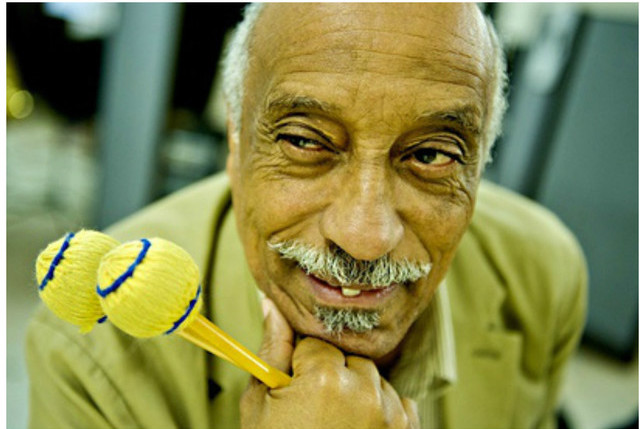 Mulatu Astatke at 70: Ethiopian tuning, Latin rhythms, the wah-wah pedal – ahead of a festival of African culture, Richard Williams hails a composer who likes to mix it up. (The Guardian)
Mulatu Astatke at 70: Ethiopian tuning, Latin rhythms, the wah-wah pedal – ahead of a festival of African culture, Richard Williams hails a composer who likes to mix it up. (The Guardian)
Richard Williams
Friday 5 September 2014
Everybody knows that Ethiopian jazz is the only kind worth listening to these days,” a bored Roman socialite remarks during one of the many party scenes in Paolo Sorrentino’s film The Great Beauty. It sounds like an epitaph. How could something so special, so original, survive the embrace of people so devoted to superficiality, so quick to move on to the next sensation?
As a fashionable novelty, Ethiopian jazz may indeed have had its moment in the spotlight. As an evolving form, however, it demonstrates greater resilience. Its roots lie deep within the musical culture of a country that, with the exception of a brief period under Italian occupation between 1936 and 1941, has enjoyed 3,000 years of independence. The first to realise that its distinctive indigenous modes and textures could be blended with those of American jazz was Mulatu Astatke, the composer and bandleader whose early recordings began to attract a cult following 15 years ago, after being unearthed and reissued by an enthusiastic Frenchman.
Astatke, whose appearance in London on 13 September will be a highlight of the Southbank Centre’s Africa Utopia festival, was supposed to devote his life to aeronautical engineering. Instead, he invented a musical genre and became the central figure in an enormously successful series of anthologies that dug deep into the origins of a fascinating but long-hidden world.
The 16-year-old Astatke had arrived in Britain in 1959, sent from Addis Ababa to North Wales by his wealthy parents, first to Lindisfarne College and then to Bangor University. But music got in the way of those initial career plans, and his gifts took him to Trinity College of Music in London, where he studied piano, clarinet and harmony, and to the Eric Gilder School of Music in Twickenham, whose pupils included the Ghanaian saxophonist Teddy Osei – later to found Osibisa, the pioneering Afro-rock group – and Labi Siffre, the singer-guitarist. He began playing vibraphone and piano in the clubs of Soho with expatriate African and Caribbean jazz musicians, and in dance halls with the popular Edmundo Ros orchestra.
Leaving London in 1963, he enrolled as the first African student at the jazz-oriented Berklee College in Boston, whose alumni include the vibraphonist Gary Burton and the pianist Keith Jarrett. Moving to New York, he pursued his interests in jazz and Latin music.
Read more at The Guardian »
—
Join the conversation on Twitter and Facebook.

























